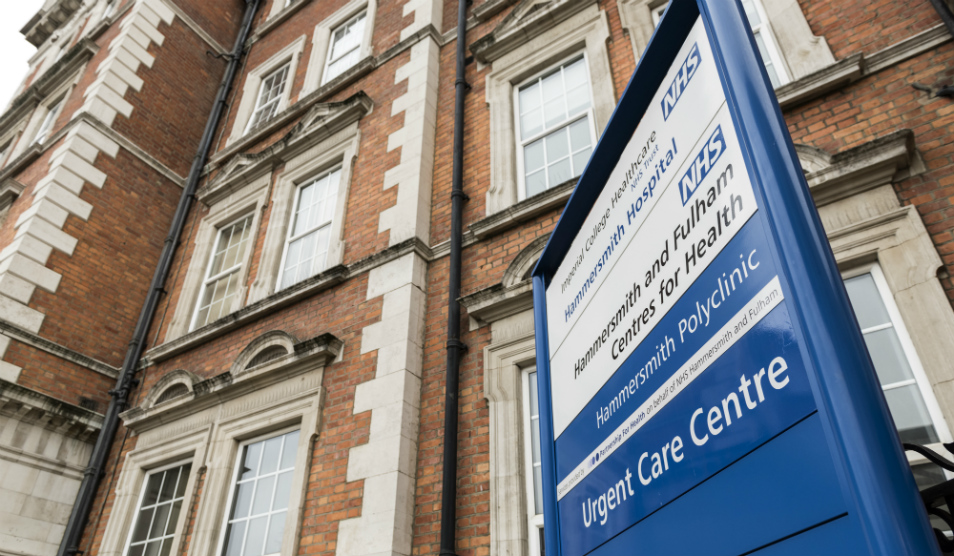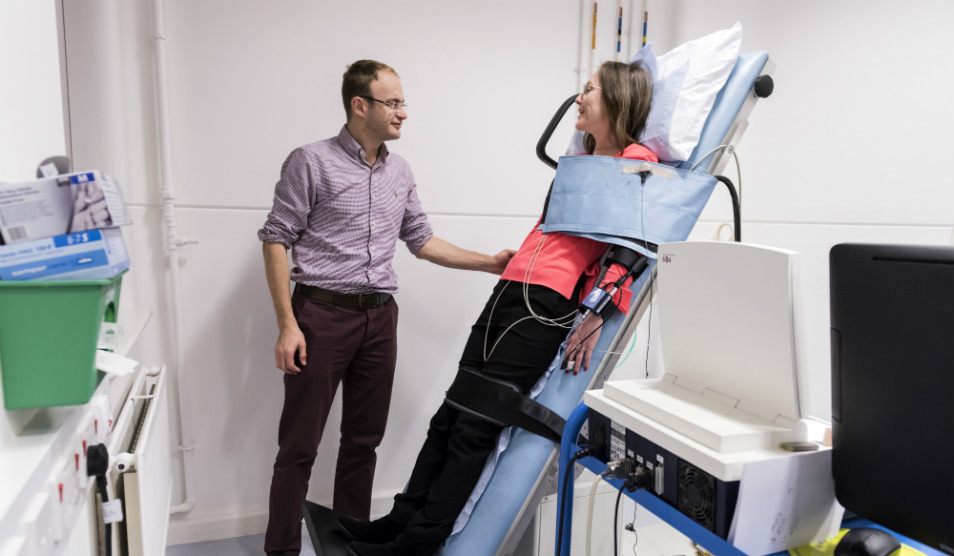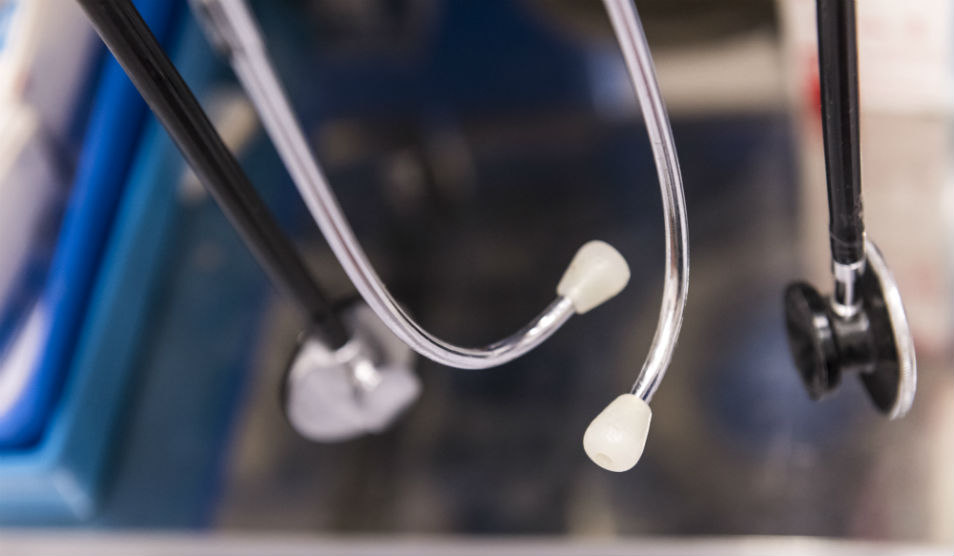Syncope
Contact
- General Enquiries
- 020 8383 4967
Visitor Information
Translation help:
To translate this page into your preferred language, click the Google Translate icon in the top-right menu and select your desired language.
Syncope is a medical term for a blackout or faint caused by a sudden drop in the supply of blood to the brain, leading to a short-term loss of consciousness. The Imperial College Healthcare syncope diagnostic unit is a high volume service investigating the causes of syncope events and providing care for sufferers of syncope. Additionally, we offer a unique nurse-led and patient-centred tilt table clinic service.
Conditions and treatments
We treat a range of conditions including:
- blackouts
- loss of consciousness
- postural orthostatic tachycardia syndrome (POTS)
- vasovagal syncope
- reflex syncope
- neurocardiogenic syncope
- funny turns
We offer clinicians, patients and their families support by making clear diagnoses and recommending lifestyle changes to manage their condition.
Patients are normally referred to the service for a tilt test by their GP or another specialist. If symptoms persist patients may be referred directly to our syncope clinic for specialist advice and further investigation.
We also provide tilt tests for children, often with the support of a paediatric play specialist. We work with paediatric consultants to provide early diagnosis and appropriate management of paediatric patients with syncope and POTS.
Clinics
Imperial College syncope diagnostic unit
Address
Clinical investigations centre
Ground floor
B block
South corridor
Hammersmith Hospital
Du Cane Road
London W12 0HS
Hours
Wednesday afternoons from 14.00.
Contact information
Email: SYNCOPE.SMH@NHS.NET
Meet the team
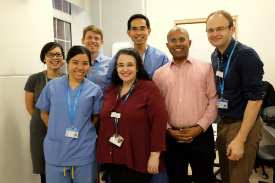
Consultants
Dr P Boon Lim, consultant cardiologist and clinical lead for syncope
A nationally and internationally recognised electrophysiologist and syncope specialist with an active research interest in syncope, who is frequently invited to lecture on mechanisms and novel treatments for syncope. Dr Lim's full profile can be found in our consultant directory.
Prof Darrel Francis, consultant cardiologist
An internationally renowned academic who continues to take a lead in clinical and scientific innovation and research in syncope and cardiovascular medicine in London.
Syncope nurse specialists
Andreas Dirksen
A dedicated syncope nurse who aims to improve patient care through excellent communication and understanding mechanisms of syncope.
Patricia Taraborrelli
An experienced syncope nurse, she is committed to the care and education of her patients and the exploration of new care and treatment options through research.
Team secretary
Deborah Bourke
A dedicated and experienced secretary who is committed to providing a smooth patient journey.
Clinical researchers
Dr Chiao Wen Lim, clinical research registrar in cardiology
A clinical research registrar working on the understanding of vasovagal syncope, the delivery of high quality care and best practice syncope treatments for patients.
Dr Szabolcs Nagy, clinical research fellow in cardiology
A clinical research fellow working on electrophysiological background and complex, holistic management of syncope patients and the role of the autonomic nervous system in patients who suffer with recurrent fainting that is not treatable with current medical management.
Dr Alina Hua, clinical research fellow in syncope
A clinical fellow who is part of the research team at Imperial College London, participating in clinical trials within the cardiovascular unit.
Patient information
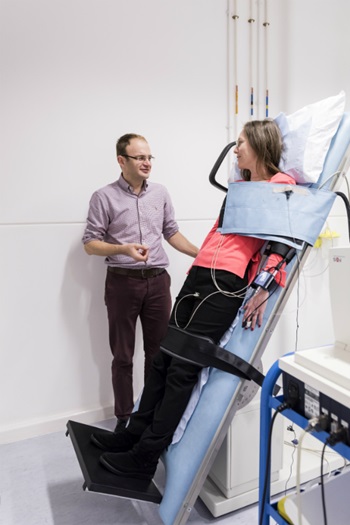
If you have been referred to our syncope service, you may be asked to have a tilt test. This is a non-invasive test. One of our nurse specialists will ask you to lie on a tilt table, which looks like a normal examination couch, except that it has a foot rest at one end. It also has two safety straps that fit around your upper body and just above your knees to keep you safe throughout the test. After the first five minutes where you will lay flat, the head of the tilt table will then be tilted up to a 60 degree angle. This means that you will now be standing almost upright. You will then remain in the standing position until the end of the test.
The nurse will stay with you the whole time. While you are having the test, we will continually measure your heart rate, respiration and blood pressure. It is important for you to tell us during the test if you do have any symptoms such as lightheadedness and if they are familiar or not.
Please continue reading for more information about how to prepare for your tilt table test.
Before your appointment
Please do not eat or drink for four hours before your tilt test, however you can take all your regular medications as per normal.
You may wish to bring someone to your appointment with you who has witnessed one of your events, or someone who can escort you home after your test. This is not essential and is something you may want to discuss with the syncope nurse ahead of your visit.
To enable us to attach the necessary heart, respiration and blood pressure monitoring equipment used during the test, you are asked to wear clothes that allow your chest to be accessible, eg, trousers and a top without a high collar or tight sleeves.
Before the tilt test you will be sent an information sheet which explains in more detail what the test involves and how to prepare for it. We strongly encourage you to keep a diary of your symptoms or faints in the weeks leading up to your appointment. If you have any concerns or questions do not hesitate to contact the nurse before the day of your test.
Please remember to check your appointment letter for anything specific you have been asked to take with you. In addition, it would be helpful if you could bring the following:
- Your full address and telephone number(s)
- Your appointment card and appointment letter
- Your GP’s name and address
- Money to pay for any prescriptions, or an exemption card
During your appointment
Upon arrival, check in at the reception area of the cardiac investigations centre. Please note that we are a teaching hospital, so medical students may be present for some appointments. If you do not wish to have them in the room please let the nurse or doctor know and the students will be asked to step outside.
You should expect to be with the syncope nurse for up to two hours when attending for a tilt test. A tilt test is the main way we determine if you are having faints or near faints and the particular cause of those events. It is non-invasive and performed in an outpatient setting by the syncope nurse specialist. The tilt test plays a central role in planning appropriate management and future care for patients.
The tilt test itself lasts up to 40 minutes, but the overall appointment including the detailed consultation, discussion and preparation takes between one and a half and two hours.
During the test you may feel faint and the nurse will make sure you have recovered completely before leaving. We conduct the tilt test in a controlled environment within a highly experienced cardiology department so that we can deal with any symptoms that occur during the test.
The tilt test may also involve carotid sinus massage where the carotid artery on the side of your neck is rubbed. At the end of your tilt test you will receive immediate feedback and advice from the syncope specialist nurse.
After your appointment
Once diagnosed we will provide you and your referring clinician with guidance on strategies for handling your symptoms, which can often be managed through changes to your lifestyle. A full written report will be sent to you and your doctor.
Some patients may benefit from the introduction of medication, and in a small minority of cases other treatments such as pacemaker implantation or other therapies may be considered.
Refer to this service
For rapid or secondary care NHS or private referrals please refer by email to our dedicated national hotline address.
Email: syncope.smh@nhs.net
In your referral letter please provide a mobile number and/or email address for the patient and we will try to contact them directly to select a suitable appointment date.
If email referral is not possible referral letters should be sent to the address below.
Address
Imperial syncope diagnostic unit
Clinical investigations centre
Ground floor
B block
South corridor
Hammersmith Hospital
Du Cane Road
London W12 0HS
Please try and include as much clinical information as possible with the referral.
Additional information
Contact information
For any enquiries about the syncope service or how to be referred, please email SYNCOPE.SMH@NHS.NET.
The Imperial College syncope diagnostic unit
The syncope unit at Hammersmith Hospital is considered one of the best in London. This highly-regarded team is led by Dr Boon Lim, a dynamic cardiologist with an active research interest in developing novel strategies to treat arrhythmias and syncope. The focus of the unit is to provide compassionate, patient-centred care with a focus on communication to improve the understanding and wellbeing of patients with syncope.
Research and clinical trials
Research is central to the ethos of our syncope service. We actively engage in research activity to understand mechanisms of syncope and to understand how to best treat it. Our medical staff work closely with the cardiovascular research department at Imperial College Healthcare NHS Trust, and our strategy is to reflect on our syncope service to enhance and improve it. Furthermore, we are also working nationally and internationally with syncope experts on research trials.
Further online resources
- Stop Fainting - patient resources created by the Trust's syncope team as part of a study, supported by Imperial Health Charity
- STARS
- POTS UK (for patients with postural orthostatic tachycardia syndrome)
Latest news See all news
-
 Read the full story
Read the full storyHeart health check pop-up coming to Portobello Road Market
Members of our cardiac team and other local NHS teams will be joining forces with a national charity to offer free heart health checks to the public at Portobello Road Market on Wednesday 29 May, between 10am and 2pm. The Pumping Marvellous…
-
 Read the full story
Read the full storyHeart failure nurse wins national award from charity
Carys Barton, a consultant nurse in heart failure at Imperial College Healthcare NHS Trust, has won a Roy Award from the Pumping Marvellous Foundation in recognition of her outstanding contribution to heart failure services. The Roy Award is an…

